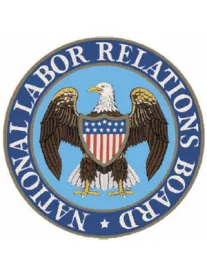On March 22, 2023, National Labor Relations Board (NLRB or Board) General Counsel Jennifer A. Abruzzo issued a memorandum to all NLRB Field Offices on the implications of the Board’s February 21, 2023, decision in McLaren Macomb, 372 NLRB No. 58 (2023).
In McLaren Macomb, the Board found an employer violated the National Labor Relations Act (NLRA) by offering severance agreements to furloughed employees containing overbroad non-disparagement and confidentiality provisions, which interfered with employee rights under Section 7 of the NLRA. Among others, Section 7 grants employees the right to engage in “concerted activities for the purpose of … mutual aid or protection ….” the Board ruled the non-disparagement provision infringed on employee rights under Section 7 to criticize the employer’s workplace policies. The Board also ruled the confidentiality provision interfered with Section 7 rights because it prevented employees from discussing the severance agreement (including its unlawful non-disparagement provision) with others, including the NLRB, coworkers, and the employee’s current or future union.
The Board’s decision created some confusion over the enforceability and lawfulness of severance agreements and other employment-related agreements.
General Counsel Abruzzo then issued the memorandum to assist the NLRB Field Offices in their responses to inquiries from the public on the implications of McLaren Macomb. Albeit not legally binding or reflecting the views of the Board, the memorandum provides insight into how General Counsel Abruzzo and the NLRB Field Offices may interpret common provisions in severance agreements and other agreements in the wake of McLaren Macomb. The memorandum addressed the following:
-
Severance agreements are not per se unlawful under the NLRA. Citing prior Board decisions, General Counsel Abruzzo confirmed that employers may continue to lawfully offer severance agreements containing a release of employment claims to employees without violating the NLRA, provided they do not contain overly broad provisions interfering with Section 7 rights.
-
Surrounding circumstances are not relevant when analyzing whether a provision is lawful. According to General Counsel Abruzzo, an employer cannot have a legitimate interest in maintaining a facially unlawful provision in a severance agreement. Thus, the circumstances surrounding a specific provision are not relevant.
-
The mere offering of a severance agreement with an unlawful provision violates the NLRA, even if an employee does not actually sign the severance agreement. General Counsel Abruzzo interprets the mere offering of a severance agreement with an overly broad provision to be inherently coercive and violative of the NLRA, because it conditions severance benefits on the waiver of statutory rights to engage in future protected concerted activities or to file or assist in the investigation and prosecution of charges with the Board.
-
Offering a severance agreement to a supervisor could be unlawful. General Counsel Abruzzo opined that even though supervisors are not generally protected by the NLRA, it would be unlawful for an employer to retaliate against a supervisor who refuses to proffer an unlawfully overbroad severance agreement, and it could be unlawful to offer a severance agreement to a supervisor if it would prohibit a supervisor from participating in a Board proceeding.
-
McLaren Macomb applies retroactively to severance agreements executed before the decision. General Counsel Abruzzo explained that, because all Board decisions are presumed to apply retroactively, the holding of McLaren Macomb applies to severance agreements entered into before February 21, 2023 (i.e., the date of the decision). While acknowledging that the six-month statute of limitations under Section 10(b) of the NLRA may apply to an unlawful proffer of a severance agreement with overbroad provisions, General Counsel Abruzzo opined that “maintaining and/or enforcing” a previously entered into severance agreement with unlawful provisions would continue to be a violation and a charge alleging such a violation would not be time-barred.
-
In general, the entire severance agreement will not be invalidated by a single overbroad provision, just the offending provision. Recognizing that each case is fact specific, General Counsel Abruzzo indicated the NLRB generally will seek to have the specific unlawful provisions voided instead of voiding the entire agreement, “regardless of whether there is a severability clause or not.” General Counsel Abruzzo encouraged employers to proactively advise former employees subject to severance agreements with unlawful provisions that such provisions are null and void and the employer will not seek to enforce the provisions or pursue penalties for breach of the unlawful provisions. General Counsel Abruzzo acknowledged that such conduct would not cure a technical violation, but she said it “could form the basis for consideration of a merit dismissal if a meritorious charge solely alleging an unlawful proffer is filed.” Employers considering such an approach should consult with counsel.
-
Former employees are entitled to the same protections as current employees. General Counsel Abruzzo asserts that former employees are entitled to the same protections as current employees under the NLRA, noting that the statutory definition of “employee” is not limited to employees of a particular employer, discussions protected under Section 7 are not limited to discussions with coworkers, and former employee involvement in NLRB proceedings constitutes mutual aid and protection under Section 7.
-
Neither employees nor their unions can voluntarily waive the future exercise of Section 7 rights. Citing public policy considerations, General Counsel Abruzzo opined that, regardless of whether the employer, the employees, or a union on behalf of employees requests an overbroad confidentiality or non-disparagement provision, employees cannot waive the future exercise of their Section 7 rights.
-
Prior guidance regarding the terms of “non-Board” settlement agreements are consistent with McLaren Macomb. The memorandum confirmed the guidance regarding non-Board settlements (i.e., settlements between the parties that result in a withdrawal of an unfair labor practice charge) in a 2006 memorandum issued by the NLRB’s Office of the General Counsel, OM 07-27, is consistent with the Board’s decision in McLaren Macomb. OM 07-27 outlined concerns about various provisions in non-Board settlements, including: waivers of the right to file NLRB charges on future unfair labor practices and on future employment; waivers of the right to assist other employees in the investigation and trial of NLRB cases; narrowly tailored confidentiality clauses and clauses that prohibit an employee from engaging in non-defamatory talk about the employer; and unduly harsh penalties for breach of the agreement.
OM 07-27 acknowledged that, despite a general rule against provisions limiting an individual from engaging in discussions about the employer or the terms of the settlement agreement, non-Board settlements could contain provisions prohibiting defamatory statements and the disclosure of the amount of money received under the settlement agreement. OM 07-27 also acknowledged that, while employees may not release future rights, in certain circumstances, “an employee may knowingly waive the right to seek employment with a named employer in the future.” -
Narrowly tailored confidentiality and non-disparagement provisions may be lawful. General Counsel Abruzzo opined that confidentiality provisions restricting the dissemination of proprietary or trade secret information for a period of time based on legitimate business justifications could be lawful, but she did not provide an example of lawful language. Similarly, she opined that a non-disparagement provision may be lawful if it is limited to statements that “meet the definition of defamation as being maliciously untrue, such that they are made with knowledge of their falsity or with reckless disregard for their truth or falsity.”
-
A “savings clause” or disclaimer may resolve ambiguous terms, but it would not necessarily cure overbroad provisions. General Counsel Abruzzo also confirmed her opinion that even if a severance agreement contained a NLRA disclaimer or other statement outlining employee rights under Section 7, it would not necessarily cure an overbroad provision and an employer may still be liable for mixed or inconsistent messages provided to employees.
-
Beyond non-disparagement and confidentiality provisions; other common provisions may be unlawful. Finally, General Counsel Abruzzo identified several other types of common provisions that she views as problematic and potentially interfering with Section 7 rights, including: non-competes, no solicitation, no poaching, cooperation requirements for current or future proceedings, and broad liability releases and covenants not to sue that go beyond the employer, employment claims, or matters as of the date of the agreement.
General Counsel Abruzzo’s memorandum suggests the NLRB Field Offices will carefully review severance agreements and other employment agreements to assess whether each provision interferes with employee rights under Section 7. Employers should consult with experienced labor counsel to thoroughly assess severance agreements and other employment agreements in light of Section 7, the McLaren Macomb decision, and the General Counsel’s memorandum.




 />i
/>i
